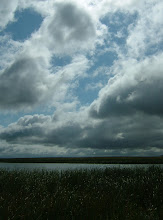Wednesday, February 20, 2008
Omens
The full moon was hanging in the clear blue winter sky, behind black silhouettes of naked trees. It was afternoon, not quite dusk. Cold. A hawk, with feathers of the underside of its wings and body a chalky white, flew across the road in front of my car, under the white moon. I wanted to be of some secret society where the hawk and the full moon in the same winter sky had special meaning, held an omen of some great thing to come. But really, it was just a beautiful sight and that was enough.
Subscribe to:
Post Comments (Atom)

2 comments:
Did you see the eclipse? Another wonder of nature missed by most, glued to the TV rather than looking outside. Perfect night for it, too.
At intermission of Othello last night I peeked out.
There are references to the moon sun and eclipses in Othello.
Seemed kinda wondrous. From a study on Othello:
After Othello has just smothered/strangled Desdemona and descended into his asyndetodic breathlessness, he speaks a longer sentence on his expectation of portents:
"Methinks it should be now a huge eclipse/ Of sun and moon, and that th' affrighted globe/ Did yawn at alteration (5.2.99-101)."
In other words, such a great and explosive event has now taken place that the heavens should confirm its hugeness by some kind of omen. Something as significant as Desdemona's death should not pass unnoticed by the heavens; indeed, it "rocked" Othello's world, and since his world is a huge one, why shouldn't it also rock the heavens?
Othello scholar Jane Adamson has tried to explain the word "affrighted" in line 100 as a word that not only gives insight into the heavenly shakings but also into Othello's soul: "It suggests to us very clearly his incipient sense of the fear, chaos, measureless depths of misery and horror lurking beneath the expressed by unrealized notions of 'eclipse'" (Othello as Tragedy, 278). As such the term has a double significance: on the one hand, personifying the "globe," the eclipse would "scare" the world and make it "react" with an earthquake; on the other hand, pointing to Othello, it betrays a (still unconscious?) fear that he now has about the turn of events. In any case, the expected tumult in heaven is lacking.
Coincidence? Maybe, Maybe not.
Shakespeare is amazing.
Post a Comment